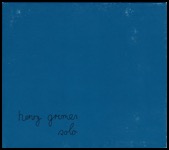January 2014
夢枯記032 Henry Grimes | Solo (Bass and Violin)
22 01. 14 02:01 夢枯記 Yumegareki | Henry Grimes
contrabass & violin solo /2 cds/ilkmusic/2008
http://en.wikipedia.org/wiki/Henry_Grimes (wikipedia)

【Yumegareki 032】
This music goes beyond the role of a mirror to reflect the words of ourselves and others. It flows and resonates as deep blue sky and sea that reflect nothing. After listening to this music, I felt nothing but a sense of wonder.
There is a place that can keep itself only by the changes while our bodies are constrained by historical and geographical restrictions. That is the place located just before the so-called “tradition”. This hard-to-identify “something” doesn’t exist nor nonexistent.
Nāgārjuna, an Indian monk in the second century A.D., came up with the radical theory of “Ku.” “Ku” is something like “emptiness.” It is a difficult concept to understand because it means more than what words would convey. In this theory he negated all the things including all sorts of materials, even words and their meanings. Nothing exists. The world in front of us only appears in relationship to others. However, it doesn’t necessarily deny the wholeness of the world. Instead, it connotes the positive affirmation within the movements.
Henry’s performance of a bass and a violin lasted two and a half hours, taking turns between the two instruments. He recorded this piece after suspending his activities for about three decades. It conjures up a thin but pure sound in a deep radical breath through Henry’s “forsaken body.” The texture of this sound is similar to the experience of “emptiness.” It is as if the letters of the sound looming up from the unseen horizon between the sky and the sea.
I remember Ku-Kai, a founder of esoteric Japanese Buddhism, lived in the 8th century. His name, Ku-Kai, consists of two Chinese characters, “Sky” and “Sea,” of which the character “Sky” also means “emptiness.” In his major works, he talked about “the letters of inner voice.” They are the rhythm of breathing that has the largest impact on the world. According to Mr. Seigo Matsuoka, the inner voice is the vocal energy of lives, while the letters are the characteristics of breathing not for writing. His performance is like photosynthesis of a plant full of quiet internal energy. It is a rhythm of a deep breath in a form of biorhythm of bioenergy.
This music seems to expand a constant deep breathing in a place different from the conscious one that seeks for poems dedicated for the deceased and the living. This music may have illuminated our consciousness of the memory of the sound movements hidden deep inside our bodies. The memory that the words were created by the vocal dynamics.
夢枯記は音楽の夢の枯れかけた言葉にすぎないのだろうか。音楽は正に目覚めている時間なのに、音楽は、書けば目覚める夢、でしかなくなる。ただのこされるものは、問いの生まれそうな感触、それだけかもしれない。それをさがしながら記すしかない。音楽は鏡のようにすべてを映す。なのに映された鏡はもうここにない。だから古鏡のように、音楽それ自身は鏡ではない。なにも映さないなにもない空と、なにも映さないなにもない海が、そこにある。その境界の見えない水平線から音楽が聴こえてくるまで、声なる空と母なる海がよみがえるまで、ことばはたぶん、生まれることはない。そしてことばは生まれてもすぐに消えていく。ことばを、問いを、書きとめる言葉だけがのこる。年末年始に一週間だけなのだがイギリスをおとずれ、ロンドンで新年を迎えた。遠くから見たテムズ川付近のニューイ…もっと読む... Read more...
http://en.wikipedia.org/wiki/Henry_Grimes (wikipedia)

【Yumegareki 032】
This music goes beyond the role of a mirror to reflect the words of ourselves and others. It flows and resonates as deep blue sky and sea that reflect nothing. After listening to this music, I felt nothing but a sense of wonder.
There is a place that can keep itself only by the changes while our bodies are constrained by historical and geographical restrictions. That is the place located just before the so-called “tradition”. This hard-to-identify “something” doesn’t exist nor nonexistent.
Nāgārjuna, an Indian monk in the second century A.D., came up with the radical theory of “Ku.” “Ku” is something like “emptiness.” It is a difficult concept to understand because it means more than what words would convey. In this theory he negated all the things including all sorts of materials, even words and their meanings. Nothing exists. The world in front of us only appears in relationship to others. However, it doesn’t necessarily deny the wholeness of the world. Instead, it connotes the positive affirmation within the movements.
Henry’s performance of a bass and a violin lasted two and a half hours, taking turns between the two instruments. He recorded this piece after suspending his activities for about three decades. It conjures up a thin but pure sound in a deep radical breath through Henry’s “forsaken body.” The texture of this sound is similar to the experience of “emptiness.” It is as if the letters of the sound looming up from the unseen horizon between the sky and the sea.
I remember Ku-Kai, a founder of esoteric Japanese Buddhism, lived in the 8th century. His name, Ku-Kai, consists of two Chinese characters, “Sky” and “Sea,” of which the character “Sky” also means “emptiness.” In his major works, he talked about “the letters of inner voice.” They are the rhythm of breathing that has the largest impact on the world. According to Mr. Seigo Matsuoka, the inner voice is the vocal energy of lives, while the letters are the characteristics of breathing not for writing. His performance is like photosynthesis of a plant full of quiet internal energy. It is a rhythm of a deep breath in a form of biorhythm of bioenergy.
This music seems to expand a constant deep breathing in a place different from the conscious one that seeks for poems dedicated for the deceased and the living. This music may have illuminated our consciousness of the memory of the sound movements hidden deep inside our bodies. The memory that the words were created by the vocal dynamics.
夢枯記は音楽の夢の枯れかけた言葉にすぎないのだろうか。音楽は正に目覚めている時間なのに、音楽は、書けば目覚める夢、でしかなくなる。ただのこされるものは、問いの生まれそうな感触、それだけかもしれない。それをさがしながら記すしかない。音楽は鏡のようにすべてを映す。なのに映された鏡はもうここにない。だから古鏡のように、音楽それ自身は鏡ではない。なにも映さないなにもない空と、なにも映さないなにもない海が、そこにある。その境界の見えない水平線から音楽が聴こえてくるまで、声なる空と母なる海がよみがえるまで、ことばはたぶん、生まれることはない。そしてことばは生まれてもすぐに消えていく。ことばを、問いを、書きとめる言葉だけがのこる。年末年始に一週間だけなのだがイギリスをおとずれ、ロンドンで新年を迎えた。遠くから見たテムズ川付近のニューイ…もっと読む... Read more...

